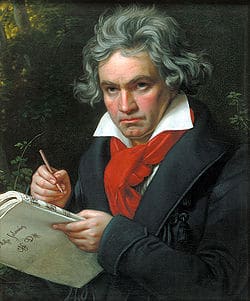
Ludwig Van Beethoven

Ludwig Van Beethoven was completely deaf for the last part of his life and yet managed to produce some of the greatest music of all time.
Beethoven Articles by Students
Who is your favorite person from deaf history?
Beethoven
by Kimberly Brunner | April 12, 2017
“Oh, I love this song.” My Grandmother smiles and turns the volume on the cassette player up. Beethoven’s Ninth Symphony rolls around the room like water when it’s played aloud, every drop and rise becoming inadvertently stuck in your heart and becoming impossible to get out. It’s incredibly recognizable, and considered to be one of the composer’s greatest accomplishments. But it was also written during a period of time in Ludvig van Beethoven’s life that could be considered incredibly painful. The Ninth Symphony was first performed in 1824, and by this time, Beethoven is thought to have been almost entirely deaf.
In letters to friends, Beethoven mentioned hearing “buzzing noises” as early as 1796, and it is apparent that his hearing deteriorated swiftly. Beethoven has been diagnosed with having many different conditions affecting the delicate inner-workings of the ear since his death in 1827. But the one thing that becomes transparently clear, from the composer’s letters and statements, is that he adapted to the changing nature of his illness. He used writing as his foremost means of communication, much of which has been kept and recorded. Such records wouldn’t have been possible without this forced means of communication.
In addition to adapting his lifestyle, Beethoven continued to adapt his music in order that he could continue composing it. It’s been noted that his style of writing changed to include more notes in the lower scale, as he could no longer hear the higher notes, which made them nearly impossible for him to play correctly. Finally, in 1814, Beethoven played his last public performance. “Archduke Trio,” known formally as Beethoven’s Piano Trio in B-flat major, was to be his last public song. And despite the impact his deafness reportedly had on his playing, Beethoven went through with the performance and finished it, triumphant in spirit if not in skill.
This, the triumph of Beethoven’s spirit, is one of the reasons I loved his story so much. Even into his years of deafness, which might’ve stopped some musicians, Beethoven continued to compose music that, to this day, brings great joy to those that hear it. His refusal to surrender to defeat has had lasting ramifications. Being a Christian, I am reminded of the verse in Romans, Chapter Five, which says, “Not only that, but we also rejoice in our sufferings, because we know that suffering produces perseverance; perseverance, character; and character, hope.”
Beethoven certainly struggled in his later years, and I imagine that he found his share of despair. But when one listens to the Ninth Symphony, caught up in it’s beauty and it’s movement, one cannot help but feel a spirit of hope that lingers there. It is music. Glorious, strong music that was composed by a man who, despite great pain and trail, refused to give up on something that he clearly loved. His determination, and his endurance, are a great testimony to those who can hear, and to those who cannot. I remember this every time I hear the Ninth Symphony fill a room, and I will proceed to turn up the volume as I remember the man who created it.
Beethoven: Black and Deaf
by Amber (Arizona, USA) | December 24, 2014
I don’t feel like I know enough about Deaf History to have an actual favorite yet, but Ludwig van Beethoven has been in my thoughts a lot lately due to recently learning that he was black.
It’s amazing to me that history can be manipulated so drastically that we could have such a large misconception about a person so fundamentally important to the music world. It makes me wonder what else was erased from history, and if there were influential Deaf people that we don’t know about simply because people refused to tell their stories.
As for Beethoven himself, I really admire his dedication to his music, despite his tinnitus making it increasingly difficult for him, in addition to his chronic abdominal pain. He pushed through suicidal thoughts, and eventually started to tailor his music to what he could hear and feel, injecting the rhythm from his African heritage, creating some of the most unique music of his age because of it.
I haven’t read anything about Beethoven learning sign language, but even without it, his friends were very accommodating for him. They would write down what was happening in their conversation, and he would either respond aloud or write his response. It makes me wonder how different Beethoven’s life would have been if he had learned sign language and had a support group of other Deaf people to communicate with and normalize his condition. Would he have led a healthier life? Would he have known better ways to deal with his rapid hearing loss?
I’ve only just started to learn about Beethoven, but he really does astound me. His symphonies are beautiful, easily earning the spot in history they’ve been placed, and he was able to make these pieces despite, and most importantly, because he was deaf. He knew exactly what he was doing while probably simultaneously feeling like he had no idea what to do at all. The fact that he moved forward, despite everything pushing him back is incredibly inspiring to me. He’s a man that I’d love to learn more about, and a great way to dive into the subject of Deaf history.
Ludwig Van Beethoven
by Kayla Nickles | July 3, 2017
There are many wonderful influential deaf people in history. My favorite would have to be Ludwig Van Beethoven. He wasn’t born deaf, but he became deaf later on in his life. We all know Beethoven as a famous musician, but not very many people associate him with the deaf community. How can someone so gifted at music be someone that couldn’t hear?
Beethoven wasn’t born deaf and he was introduced to music at a very young age. He became passionate about music and let it lead him to many great places. It was something that he poured his whole life into. Beethoven published his first music work by the age of 12! At the age of twelve, I was just learning how to talk to play “Twinkle Twinkle Little Star on the piano.
Beethoven went on to make more music. People of his time thought that it was different and out of the ordinary. When we listen to it today, we think of it being classical and of the past. When Beethoven was writing it and performing, it was the new thing. It was fresh and some people were scared off from it or the opposite, very attracted to it. This was a way that Beethoven was going beyond the musical boundaries of his time.
After finding out that he was deaf, of course Beethoven was confused. It is recorded that he wondered, “Why is it that someone with his musical ability would become without hearing, a major part of music?” I feel like if I was in his situation, I would wonder the same thing.
According to the letters that Beethoven had written, he was ashamed of being deaf at first. He was sad that he couldn’t hear his most prized possession… his musical ability. In order to communicate with others and to understand others, Beethoven would use notebooks and write down what he wanted to say or have others say to him. His complete deafness didn’t come all of a sudden, it developed over time. As he became completely deaf, he began to accept it.
Beethoven tried everything he could to try to heal what was happening with him. He went to multiple doctors and took their advice for healing. None of them worked and he continued to lose his hearing.
With the realization that this hearing loss was apart of who he was, he accepted it and continued to do what he loved. He didn’t stop making music just because he couldn’t hear it. He started to feel it. Though Beethoven’s health continued to decline, Beethoven remained faithful to his music and didn’t give it up.
I chose Beethoven as my favorite, because he didn’t let his deafness stop him from overcoming his dreams. He continued to move forward and it allowed him to stand out from the crowd. He accepted who he was and became a musical legend of all time. He is someone that we can all look up to when we’re wanting to give up on accomplishing our dreams just because we may have a “disability” or “sickness”. Anything is possible as long as we keep moving forward, despite our circumstances or “diagnosis”.
Beethoven or Helen Keller?
by Adam B. (United States) | March 8, 2013
For me, it is extremely hard to decide between Ludwig Van Beethoven and Helen Keller. Honestly, my favorite historical figure is Beethoven. Beethoven is very influential and overall impressive in the things he did. Around age 41 (approximate), he was almost completely deaf. Yet, using tools such as his rod attached to the sound of the soundboard of his piano that he could bite to feel the vibrations of the sound, he continued to write beautiful music. As a musician, this is truly inspiring and impressive to me.
Now, my favorite deaf *idol* has to be Helen Keller. Even more of an idol was her instructor, Anne Sullivan, who had enough patience to deal with Helen’s overly ignorant and feisty self as a child. Yet, Helen as an adult was very strong in the community, proving that anything is possible in the education of the deaf and the blind.
If I had to choose, it would probably be Beethoven. But as I said, I have separate opinions about both, and find it difficult to choose between them.
Nothing is Impossible
by Tiffany (Pinon Hills, CA) | March 4, 2010
I came to be on this site because my nephew decided that he wanted to learn ASL. We are both martial arts instructors and plan on opening a school soon. A family came in and their son was totally deaf but wanted to learn karate and there was no one where we live to accommodate. So my nephew thought to take a class at his college, and I came here.
Talk about being overwhelmed with emotion. I was always raised to believe that nothing is impossible. Having a walking disability myself and being told I would never walk but less do karate, I proved everyone wrong. But what if that was something society frowned upon? I would be oppressed because I could not walk as fast as someone else?
When I read about how the deaf people were oppressed it broke my heart. I am glad that there were so many people who thought this not so, and worked to create what I see now as a beautiful language. To give deaf people and their families a standard language to communicate with each other. The self esteem that is built, the achievable goals they can reach.
I grew up listening to Beethoven with my grandfather, listening to stories about Helen Keller, and others. These stories just proved what I was being told – NOTHING IS IMPOSSIBLE. So for me to sit here and say this person is my favorite or that person, I can’t. Because for me – as modern as you Michelle – putting in the effort to make this site and these lessons for people like me to learn ASL you are playing a part in deaf history. For people like Abbe de L’Epee who paved this long road for the deaf to be accepted, for William Stokoe who made this language an accepted language. I couldn’t pick just one – I am just thankful that there were people who took action and set out goals to not only educate the deaf but give them back their self esteem and dignity as humans.
Comments:
by Janeel Hew: Dear Tiffany,
I have read your writings from both the class section and this section. I commend you in your achievements in life. I would give your words a standing ovation, but I have a neural muscular disorder and cannot stand…but I am giving you a kneeling ovation!!
This is a progressive disorder that I have, but I am not about to let it stop me from doing as much as I can for as long as I can. In 2000, I crawled up Halawa, here on Molokai, Hi., to get to the waterfalls. It took 2 hours…it would have taken longer but the “Fire Ants” made me crawl (A LOT) faster. Our challenges, are really “accomplishments waiting to be achieved!!” This experience, helps us to appreciate the challenges and accomplishments of others. Blessings be upon your future accomplishments…You motivate others.
by Michelle Jay: I am so flattered and so glad that you have been able to benefit from this site. What you and your nephew are doing is fantastic and I completely agree with everything you said about Deaf history. It is heart wrenching to learn about this for the first time. Most hearing people have no idea about who Deaf people really are. Thank you so much for sharing :)
Ludwig Van Beethoven
by Emily Keller | June 22, 2017
My favorite deaf person in history would happen to be Ludwig Van Beethoven. I absolutely love music, and art, and to know that the famous Beethoven was deaf, yet still wrote the most intricate and melodious music will never cease to amaze me. We know that we hasn’t always deaf, but slowly decreased, until the point he could no longer hear. Some people refer to him as ‘Stone Deaf’, as there were some days where he admitted that he could pick up some words, near the end of his life. When he finally noticed that he really could not hear anymore, he decided to confide in a few, friends, saying: “I beg of you to keep the matter of my deafness a profound secret, to be confide to nobody, no matter whom…” It is clear that it truly hurt him, and I am sure that he was miserable, even thought it is recorded that he finally ‘accepted it’. I sometimes feel bad myself, that ASL was not yet created for poor Ludwig, because I believe that it would have made him a much more happier and pleasing man. It is said that Beethoven felt very alone, but when people wanted to speak with him, he had them write notes, and he would reply with notes as well. Ludwig Van Beethoven also made one of my favorite songs, “Fur Elise “, that can almost make you feel the misery Beethoven had for not only his lost ability, but the girl he hopelessly loved, but did not return the strong feelings that he gave so willingly. He also had a severe tinnitus, (the ringing of the ears,) which made it very difficult for him to appreciate the songs that he wrote. He began cutting himself off, scared to let anyone his awful secret. Beethoven will always be not only my favorite deaf person, but a reminder that even the most famous people in history had their hard times too, including being deaf.
Ludwig Van Beethoven
by Jasmine Dudding | October 30, 2017
When I think of a historical Deaf figure, Ludwig Van Beethoven pops into my head first. Ludwig Van Beethoven was an incredibly popular musical composer of his time, and even now he is considered one of the best in all of history.
Perhaps the most astonishing thing about Beethoven was the fact that he was completely deaf by the age of 44. However, he started becoming deaf at age 25. During the time of his hearing loss, he continued to produce musical masterpieces that stunned the world. Beethoven is an inspiration due to the fact that he continued to work hard and create music despite his minimal hearing abilities.
At the point that Beethoven became completely deaf, he went off on a retreat to find himself. While on his getaway, he felt the urge to commit suicide. However, his passion and dedication to music kept him from doing so. The passion he had for his art is a compelling and inspiring thing for future generations.
It’s a great lesson for younger generations to understand the importance of finding something that you can completely lose yourself in and fall in love with. Without passion, there is no true meaning in one’s life. Beethoven showcases this perfectly. So many individuals go to work everyday and hate what they do, they feel incomplete and miserable. If everyone stepped back and found what they truly had passion for, they would finally realize what Beethoven did: situations may be inconvenient, but if you have a purpose in your life, you can always find a way to be happy.
Another inspiring fact about Beethoven is his inspiration, dedication, and motivation that he possessed at an incredibly young age. He could have even been classified as a musical prodigy. Beethoven gave his first public performance at only the age of 7. Perhaps even more incredibly is Beethoven’s first work published, 9 Variations in C Minor for Piano, at age 12. Ludwig Van Beethoven had worked hard from the time he could perform until his final days. This motivation is something that kept him performing, composing, and writing even when he was completely deaf. This trait can be shared today all around the globe to inspire millions of people, deaf and hearing.
Finally, perhaps the most important and inspiring trait that Beethoven possessed is his ability to overcome the criticism and hate he received. As an artist, a person will receive waves of hate and doubt from everyone. This criticism can come from strangers, family/friends, and even from his or herself. When a composer/artist is alive, there is not as much popularity based around their work as compared to when they have passed away. This stands true for Beethoven as well. Beethoven, for the longest, had doubt coming from all around him. The biggest doubt that haunted Beethoven was his inner demons. As the years passed and his fear of becoming completely deaf started to become a reality, his fear haunted him so much to the point that he wanted to kill himself. He believed he was unable to be successful if he was deaf.
However, he found it in himself and in music to keep going. Although outside opinions matter to any normal human being, having doubt/hate towards yourself is the most painful type of criticism. It takes a strong person to overcome their own doubts and self fears. Beethoven was able to do this which is what, in my opinion, puts him at the top of the list as the most inspiring deaf historical figure.
Start Learning ASL Today!
 Ready to start learning real American Sign Language and not just basic signs? Do you want to be a part of the vibrant Deaf community? Check out our Free ASL 1 Course or our Complete 4-Level ASL Course options and start learning ASL today!
Ready to start learning real American Sign Language and not just basic signs? Do you want to be a part of the vibrant Deaf community? Check out our Free ASL 1 Course or our Complete 4-Level ASL Course options and start learning ASL today!








